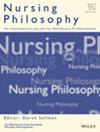打破枷锁:非殖民化的护理学语言。
IF 2.6
3区 医学
Q1 NURSING
引用次数: 1
摘要
在这篇文章中,我讨论了“非殖民化护理”的概念,回答了这个过程是关于什么的,以及如何以及何时应该这样做。我介绍了认识论的优势和殖民和非殖民化护理知识的概念的想法。我描述了我从拉丁美洲来到盎格鲁-撒克逊学院的经历,讨论了核心学科护理知识,并围绕护理语言的非殖民化提供了思考。本文章由计算机程序翻译,如有差异,请以英文原文为准。
Breaking the chains: Decolonizing the language of Nursology.
In this article, I discuss the concept of 'Decolonizing Nursing', answering what this process is about, and how and when it should be done. I introduce the idea of epistemological dominance and the concepts of colonization and decolonization of nursing knowledge. I describe my experiences of coming from Latin America and facing Anglo-Saxon academy to discuss core disciplinary nursing knowledge and provide reflections around the decolonization of nursing language.
求助全文
通过发布文献求助,成功后即可免费获取论文全文。
去求助
来源期刊

Nursing Philosophy
NURSING-
CiteScore
4.80
自引率
9.10%
发文量
39
审稿时长
>12 weeks
期刊介绍:
Nursing Philosophy provides a forum for discussion of philosophical issues in nursing. These focus on questions relating to the nature of nursing and to the phenomena of key relevance to it. For example, any understanding of what nursing is presupposes some conception of just what nurses are trying to do when they nurse. But what are the ends of nursing? Are they to promote health, prevent disease, promote well-being, enhance autonomy, relieve suffering, or some combination of these? How are these ends are to be met? What kind of knowledge is needed in order to nurse? Practical, theoretical, aesthetic, moral, political, ''intuitive'' or some other?
Papers that explore other aspects of philosophical enquiry and analysis of relevance to nursing (and any other healthcare or social care activity) are also welcome and might include, but not be limited to, critical discussions of the work of nurse theorists who have advanced philosophical claims (e.g., Benner, Benner and Wrubel, Carper, Schrok, Watson, Parse and so on) as well as critical engagement with philosophers (e.g., Heidegger, Husserl, Kuhn, Polanyi, Taylor, MacIntyre and so on) whose work informs health care in general and nursing in particular.
 求助内容:
求助内容: 应助结果提醒方式:
应助结果提醒方式:


